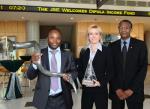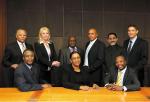Attacq's year-on-year growth quite attractive at 20.8%‚ says CEO
Attacq CEO Morné Wilken discusses property fund’s latest results and roll out of its Waterfall pipeline.
Attacq CEO Morné Wilken discusses property fund’s latest results and roll out of its Waterfall pipeline‚ in this interview conducted on March 16.
BUSINESS DAY TV: Property group Attacq has released first-half results showing a 5% rise in its net asset value from June to the end of December 2014. Rental income for the half shot up 78% mainly thanks to the roll out of its Waterfall pipeline. Joining me now on the line is CEO Morné Wilken.
Morné‚ just reading through the lines it sounds almost as if you actually weren’t that pleased even though you said it was pleasing with the growth in net asset value‚ it sounds like you almost expected more. Am I right to be understanding that or am I off the mark entirely?
MORNE WILKEN: No you do have the right to say that‚ but I just want to bring across to the listeners that Attacq is a capital growth fund and in that we take a long-term view and it’s difficult to measure every six months. Although I would have liked to have seen better results but because we do a lot of development‚ a lot of those bigger developments sometimes happen in the first six months or the last six months. So it’s always better for me to look at year on year rather than at specific six-month periods. But we obviously have to report on that. If you look at our year-on-year growth it’s quite attractive at 20.8%.
BDTV: Is that within your targets‚ is that really what you’re aiming for?
MW: We always want to create sustainable long-term capital growth for our shareholders and that’s what we are achieving. You must always assess as an investor in Attacq‚ what it is that you’re getting and I believe it’s quite attractive.
BDTV: What about the fair value of your assets because it’s quite curious to read that fair value adjustments were actually down by about a third to just over R310m and you had a lot of independent valuations. Were you overstating the value of your assets…what happened?
MW: No‚ what happened is year on year there are obviously developments that were completed and that was a big kicker‚ and then maybe the next year you don’t have as many that are completed. We really take the loss we have made in terms of like-for-like in valuations that was a number of…about R38m plus another R8m so that’s R46m and you’re not talking…what you’re saying. What you got in terms of our revaluations coming through is from a lot of developments that were completed which brings a big valuation uplift and then the next year it won’t.
BDTV: Okay‚ then how much of the portfolio is still in the development phase at this stage‚ especially Waterfall?
MW: In Waterfall we’ve got a total of about 1.4-million bulk metres left to develop over the next 10-15 years‚ which is quite a big number. If you put it in rand terms‚ say you develop buildings at…and you lease at least 20‚ then you’re looking at R28bn of potential pipeline which is just a rough calculation…saying you’re using R20‚000 as more or less a cost to build something and you multiply it by 1.4-million of bulk metres which are available.
BDTV: So essentially a huge trajectory still ahead of Attacq?
MW: Yes it is but it is impacted by the growth in SA. There is a lot of negative sentiment in terms of the South African market and that’s why we at Attacq have a diversification strategy where we’re going into emerging markets and developed markets as our strategic space in MAS plc where we hold a 45.4% shareholding that is investing in the UK‚ Germany and in Switzerland. That gives us a bit of a buffer against what happens in the rest of the market. And then in emerging markets we have investments in AttAfrica which is also very positive in terms of our whole Africa growth story and there we hold a share of about 31.25%. We’re focusing predominantly on retail‚ have three completed retail malls with two still under construction at the moment.
BDTV: Just on the investment that you have in MAS‚ yes it does give you exposure outside of SA‚ but unfortunately you weren’t able to benefit from any rand hedge quality during the half because the euro in fact weakened against the rand‚ but with a weakened rand now against what seems like all of the major currencies‚ do you expect that rand-hedge element to benefit you in the next while?
MW: It probably goes both ways‚ in the long term if you go and look at the trend over a number of years that will give you that hedge. So the one year we will have negative results due to the diversification and the next year it could be very positive. I would just say that is one of the advantages or disadvantages in terms of the diversification.
BDTV: Coming back to Waterfall…if you’ve got essentially three-quarters still to be developed‚ what are the application rates like…realistically how much would you see developing of the whole estate every year‚ say for the next five to 10 years? Is it going to be slow because of the South African economy where it is?
MW: Rather put it this way‚ whether it’s going to be a 15-year or a 20-year pipeline that is up for debate. Anyone can make an assumption. What we are seeing is a lot of interest currently as for example‚ just after December‚ we had secured or we are in the ground with a further 66‚000 square metres‚ so it gives you an indication of what we are achieving. Obviously when we’re competing for tenants‚ we are competing with a lot of other landowners or developers and it’s quite competitive. What we do have is due to the central location of Waterfall in the bigger Gauteng‚ we are getting a lot of corporates that are consolidating here which is very positive. And then you take our distribution centres‚ distribution is becoming a bigger element and there is a lot of land that has been specifically earmarked for distribution.
BDTV: And as far as the capital required to advance your ambitions‚ you raised about R640m‚ which was actually to secure the Waterfall Investment Company over the first half. How are you doing as far as capital is concerned…will you have to raise more money to realise what you want to do?
MW: I believe going to the market is our last port of call…we can look at more leveraging our balance sheet and that is definitely something we’re doing. But obviously if we need funds and we have tried all the resources‚ that’s always a possibility for us to do. But obviously it would definitely be our last preference in terms of raising money.
BDTV: And realistically if you had to go and raise debt‚ how much would you have to raise in the next year or so?
MW: That’s a very difficult question. As I sit here at the moment there are some deals that we have in the pipeline‚ so that’s about R1bn‚ but I’m saying if there is any more…I am quite comfortable. We’ve just secured the new head office for PwC as a big development‚ and the funding we’re getting and the terms we’re looking at from the local banks are very positive.

















